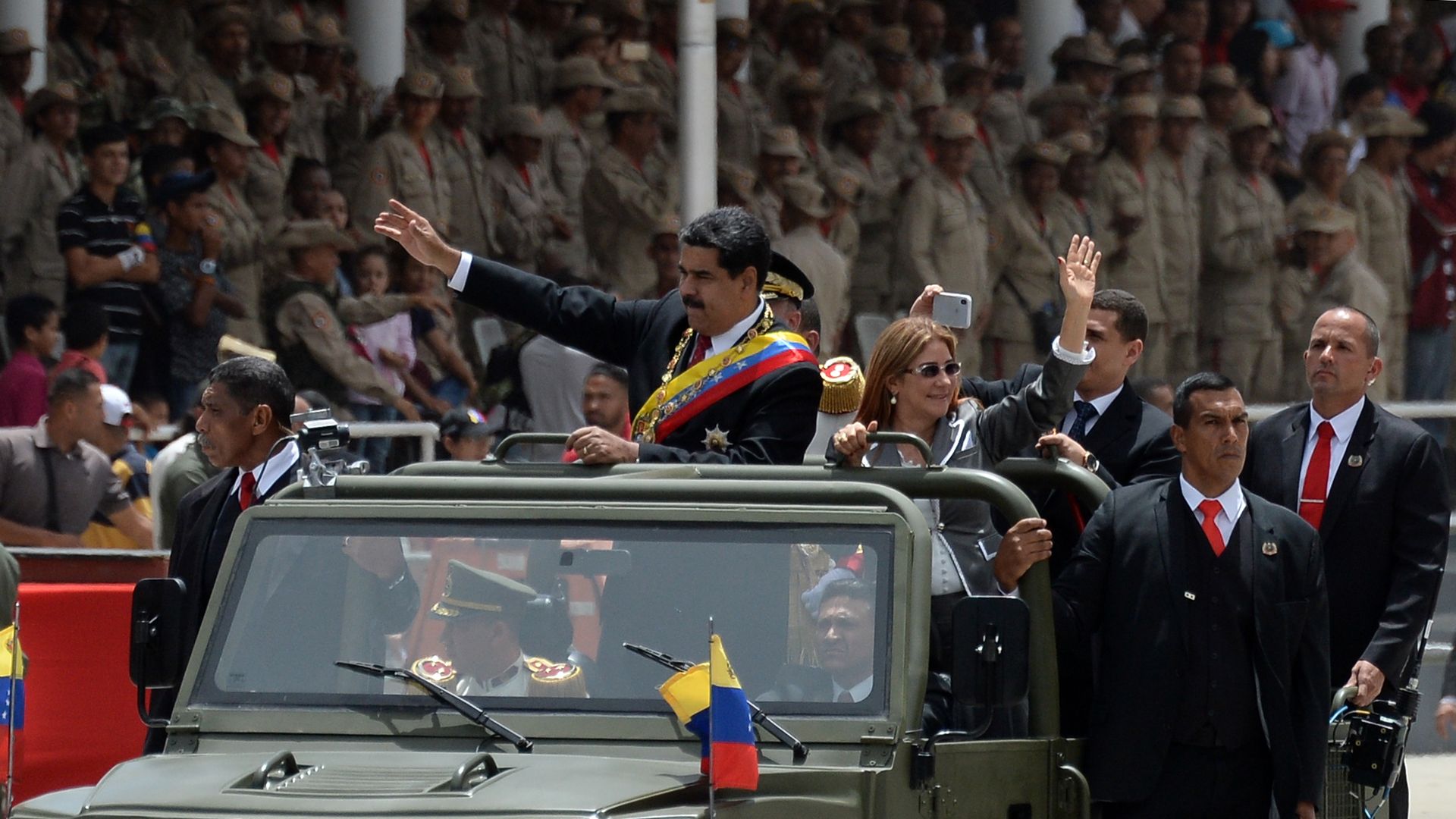The Trump-Maduro staredown
Add Axios as your preferred source to
see more of our stories on Google.

Venezuelan President Nicolas Maduro during a military parade. Photo: Federico Parra/AFP via Getty Images
The U.S. will begin evacuating non-essential diplomatic personnel from Venezuela, but will keep its embassy open, amid fears of a potential clash with Nicolás Maduro's regime.
Why it matters: Maduro's 72-hour deadline for the U.S. to evacuate all diplomats set the stage for a confrontation between an authoritarian leader desperate to hold power and a U.S. administration determined to see it taken from him. The risk of escalation in the coming days remains high.
The backdrop:
- The U.S. decision to recognize National Assembly President Juan Guaidó Wednesday as Venezuela’s interim president precipitated an avalanche, with Brazil, Colombia, Canada and several other countries following suit.
- Guaidó, who called mass demonstrations against Maduro before declaring himself president, has said the U.S. should not take orders from an illegitimate leader, a position shared by Secretary of State Mike Pompeo.
- National security adviser John Bolton reiterated today that all options, including military action, are on the table.
Moisés Naím, a foreign policy heavyweight and former Venezuelan minister of trade and industry, told me, “Both sides are setting red lines that will be crossed.” He says an armed confrontation at the U.S. Embassy is possible, but not probable.
- “This is just the immediate concrete example that points to a larger reality: For the first time, Venezuela will be a football in a major geopolitical competition,” he says.
I caught up with Naím after a World Economic Forum panel that included a fascinating exchange with Ricardo Hausmann, a former Venezuelan minister of planning now at the Harvard Kennedy School, who said all the conditions for a democratic transition are in place, and "the only thing that remains is for the armed forces to ... tell Maduro to leave.”
- Naím replied: “All the boxes he checked are correct. But there are boxes he didn’t mention. … China, Cuba, Russia, Iran. They are players, and their preferences may be different. … Not all in the international community are friends of Venezuelan democracy.”
Naím said we shouldn't expect Russian or Chinese troops in Caracas, “but we live in a world in which stealthy operations are very frequent. Will we see a presence, an influence, an attempt to shape things from these countries? Absolutely.”
The view from the region:
- Gabriela Saade, an economist who works with civil society in Caracas and was also on the Davos panel: “People cannot find food, they cannot find medicine, and they are starting to point fingers at the government.” While Venezuelan politics are deeply polarized, “most people just want a change in their lives.”
- Martin Aguirre, editor-in-chief of Uruguay’s El Pais newspaper, emails from Montevideo: "Venezuela is front-page everywhere.” He's watching for statements from the European Union, which has backed protests but not recognized Guaidó, and China, which “will have to start thinking about how to maintain influence and get their money back if there is a government change.” He also says the fact that Guaidó has not been arrested “shows how weak the government feels."
What to watch for: “The military, the military, the military,” Naím told me. They’re the protector of the regime, “but that is fraying. … We’ll know more in the coming hours, days and weeks.” In the absence of negotiation, he says, there will be confrontation.
- Axios' Jonathan Swan emails: "The big thing to watch is possible oil sanctions given Venezuela's dependence on U.S. purchases." The Trump administration has held off on such sanctions in the past out of a belief that they'd inflict more misery on the Venezuelan people.
Go deeper:
